Introduction, Specifications, and Pricing
We don't hear a lot from hard disk drive companies these days, at least not from the actual drive side. Seagate recently released updated the Guardian Series models with the 2018 update. The annual update is similar to what happened last year, a capacity increase and another step away from the competition.
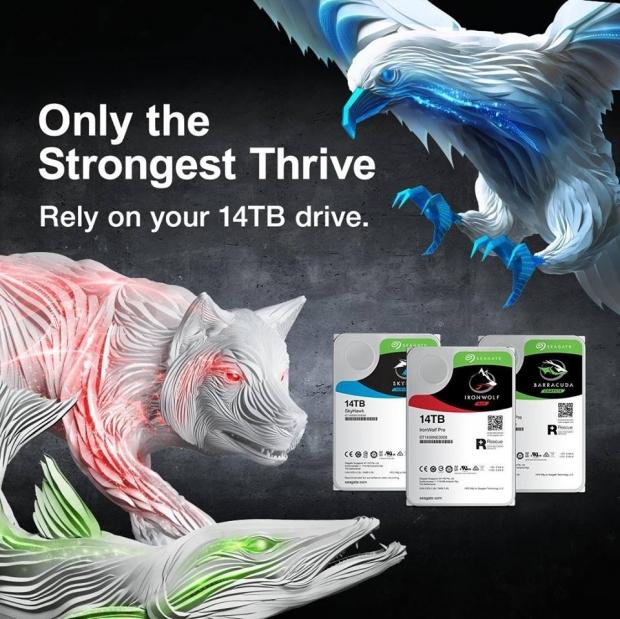
The Guardian Series splits into three consumer-facing product lines, Barracuda, IronWolf, and Skyhawk. Today we're looking at the IronWolf line that actually splits again with Pro and non-Pro models. Now that we got past the complicated breakdown on what we're actually talking about today, we can talk about what's new.
14TB with eight platters is the news this month. It's a 2TB increase over the 12TB released last year but there is a little more to the story. The first thing to know is that Seagate got sick of everyone claiming drive failures and overbuilt the Guardian Series products. That's not to say the Helium-filled drives can't fail, it's just very rare when they do.
Overbuilding these drives has allowed Seagate to quickly ramp up capacities. Not only have we seen this in practice, but also in roadmaps and hardware on display that points to clear progress to 20TB and beyond.
Specifications
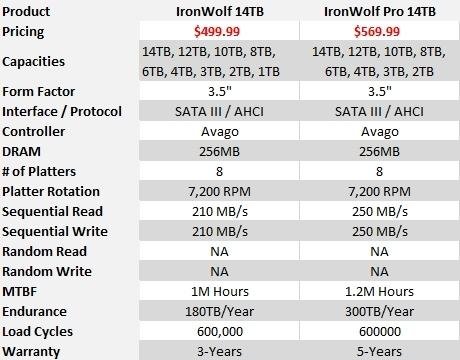
As we mentioned, IronWolf splits into two paths based on the number of drives in your system. The base IronWolf series features algorithms to combat vibration in systems with up to eight drives. Going above eight drives in the system requires the IronWolf Pro. This series supports between one and twenty-four drives in a single system.
Both series use 7,200 RPM platters and this is an important fact. Seagate's larger IronWolf drives all use 7,200 RMP platters when many of the other companies still use 5,400 RPM platters on the lower series, like the WD Red (5,400) and WD Red Pro (7,200). Both drives also use a large 256MB DRAM buffer in the 14TB capacity.
The differences don't stop there, at least on the specification sheet. The information released by Seagate states the 14TB IronWolf Pro delivers up to 250 MB/s sequential read and write performance. The base IronWolf only delivers up to 210 MB/s (per the specifications) but we found both to be equal in our desktop testing.
Features
Seagate's AgileArray technology is a suite of features designed to provide a better user experience. Here's how the company describes the features:
NAS-optimized hard drive Iron:
Wolf Health Management in compatible NAS systems continuously helps to safeguard the health of your data
Drive balance with Rotational Vibration (RV) sensors manages multi-bay vibration for long-term consistent performance and reliability. RAID performance optimized that maximizes responsiveness and uptime with NAS-aware Error Recovery Control
Advanced power management saves energy and delivers the right power at the right time
The features go beyond the specification sheet. For instance, Seagate attaches the spindle to both the top and bottom of the case to improve stability. The drives also support the ATA-8 streaming command set for increased performance with large sequential transfers. The technology allows the IronWolf to handle up to 64 data streams simultaneously.
AgileArray also features optimized power management that provides a faster response time while also reducing power consumption.
Pricing, Warranty, And Endurance
The IronWolf 14TB sells today for $499 per drive. The IronWolf Pro model with support for up to 24-drives in a system/server sells today for $569.99 each.
The base model ships with a standard 3-year warranty that includes support to write up to 180 TB per year and carries a 1 million hour MTBF. The 14TB Pro increases the warranty to 5-years and increases the endurance to a massive 300 TB per year. The MTBF increases to 1.2 million hours.
A Closer Look
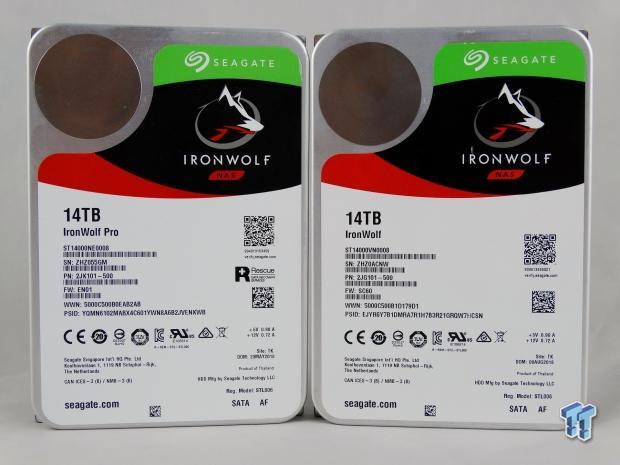
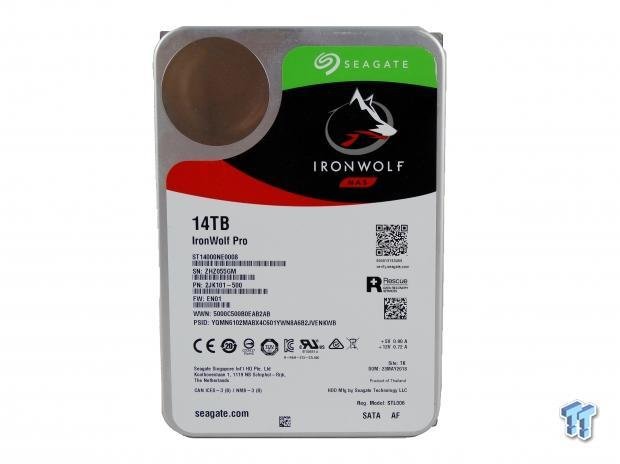
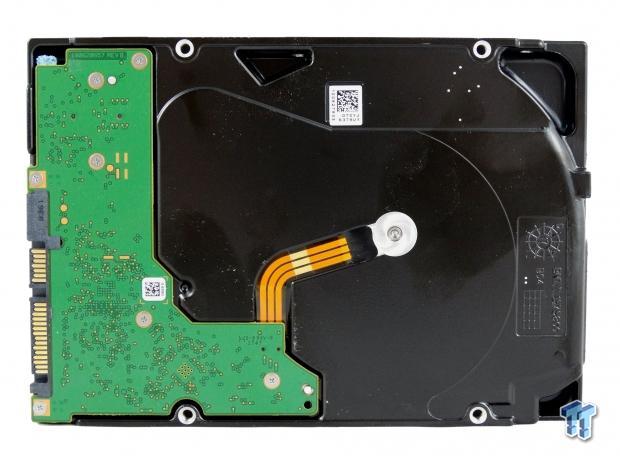
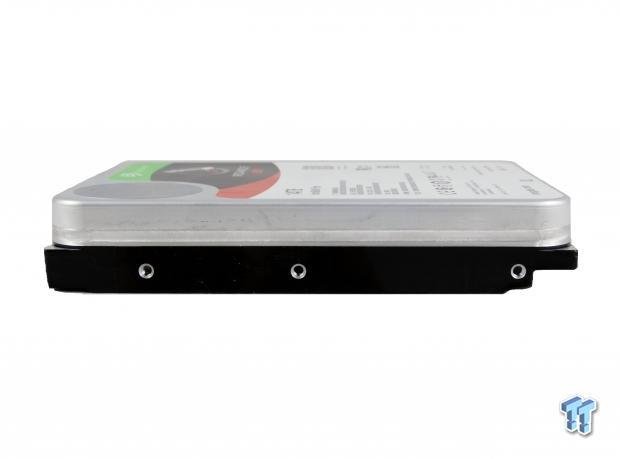
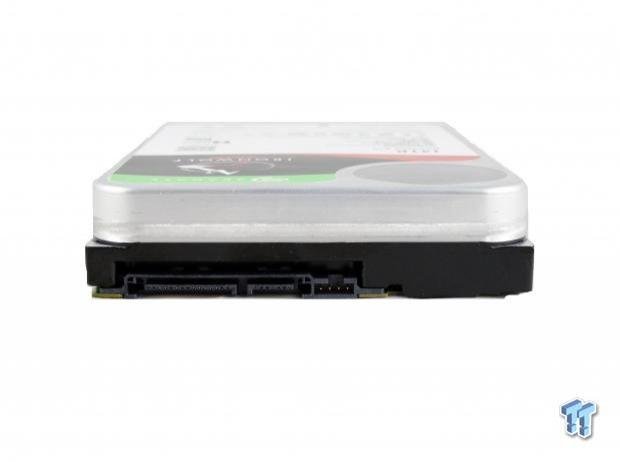
The new 14TB series doesn't have the same industrial appearance as the 10TB and 12TB drives. This is mainly due to the black painted case that reminds us of older HDDs. Seagate assures us the new drives are as robust as the previous generation. The drives still use an aluminum chassis.
The two halves of the drive were welded together just like the previous generation. The helps to keep the Helium inside, the gas that makes us talk funny is also the same gas that reduces resistance against the platters and allows for a more stable rotation.
Desktop Performance Testing
Testing Notes
In this section, we test the hard disk drives in a desktop system. The tests run against a single drive mounted in an Icy Dock tool-less drive cage. These tests come straight from our SSD test suite. Later in the review, we will combine four drives in a NAS with a RAID 5 configuration.
Sequential Read Performance
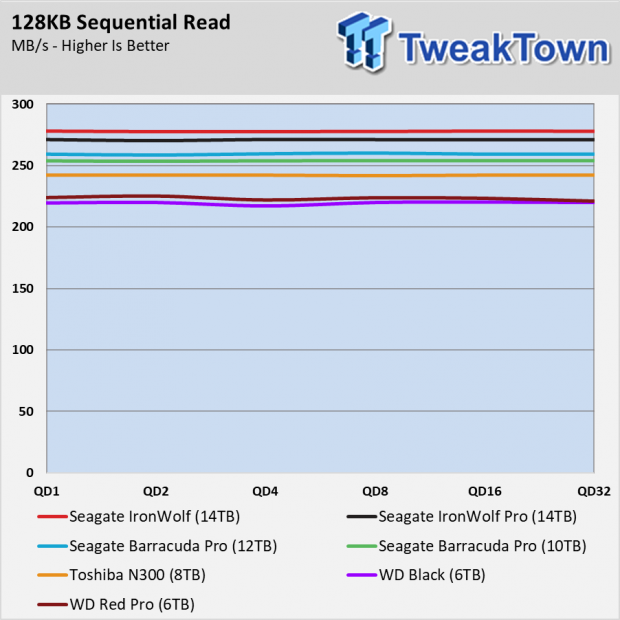
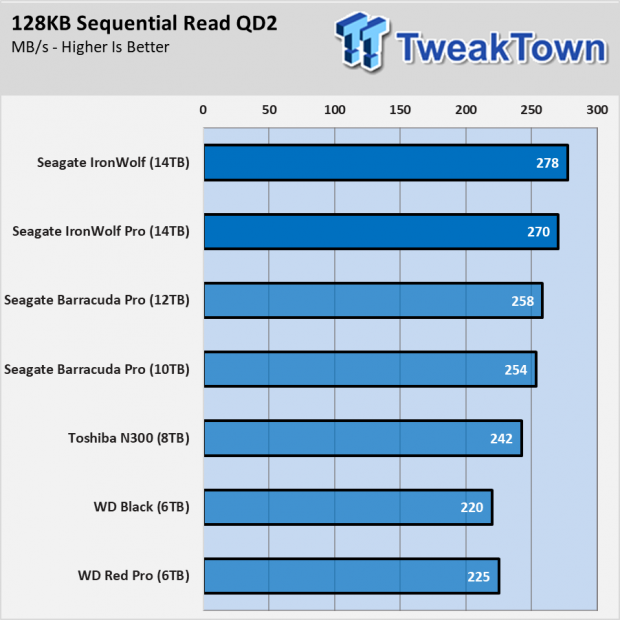
Seagate claims the IronWolf delivers 210 MB/s and the Pro model achieves 250 MB/s. We smashed those numbers in our desktop system. The IronWolf actually delivers a little more sequential read performance than the IronWolf Pro 14TB. Both drives outperform the Barracuda Pro 12TB and 10TB.
Sequential Write Performance
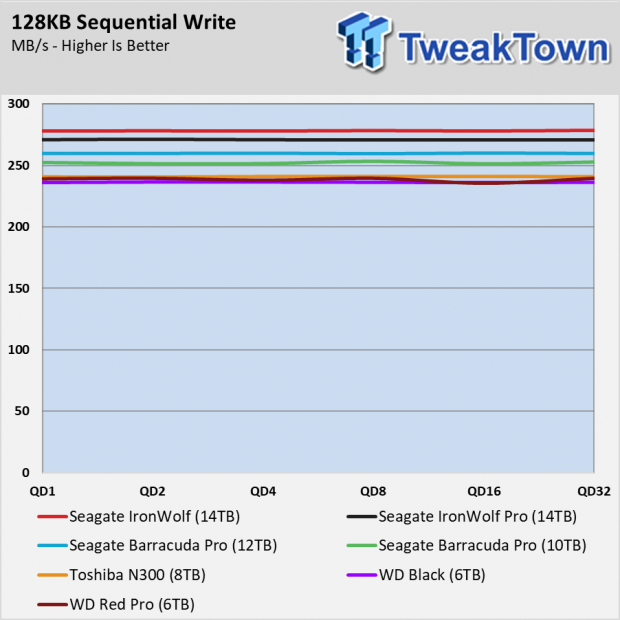
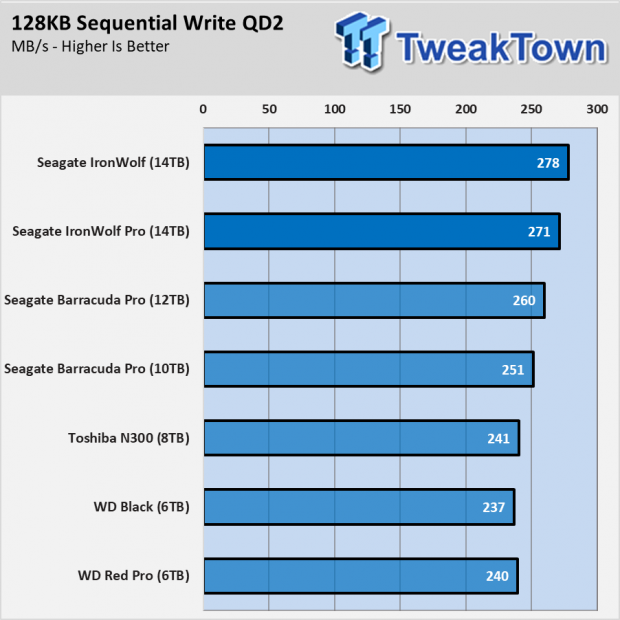
The sequential write test shows nearly identical results (as they should be). The base model is slightly faster than the Pro. Interestingly enough, I found the same thing with the 12TB models last year.
Sustained Sequential Write Performance
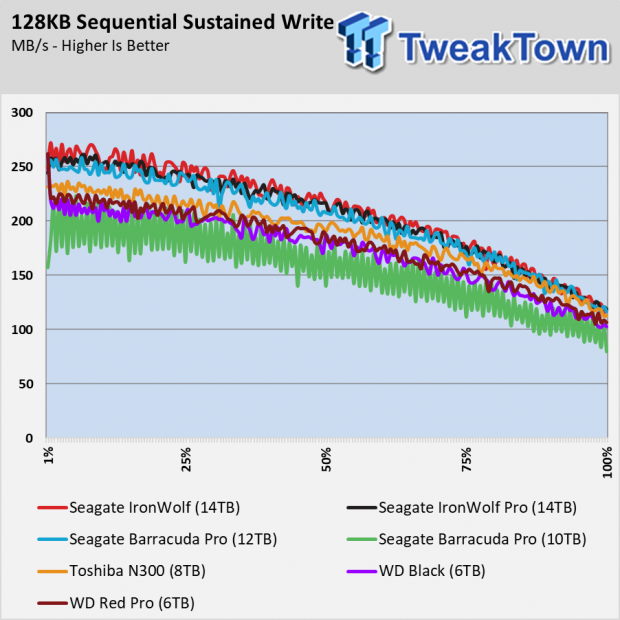
With HDDs, you can't expect 250MB/s all the time. Performance varies by the location of the data on the platters. Per our testing, the larger the drive, the longer you get higher performance. The IronWolf drives deliver the highest performance of all the drives tested through the entire LBA range.
Random Read Performance
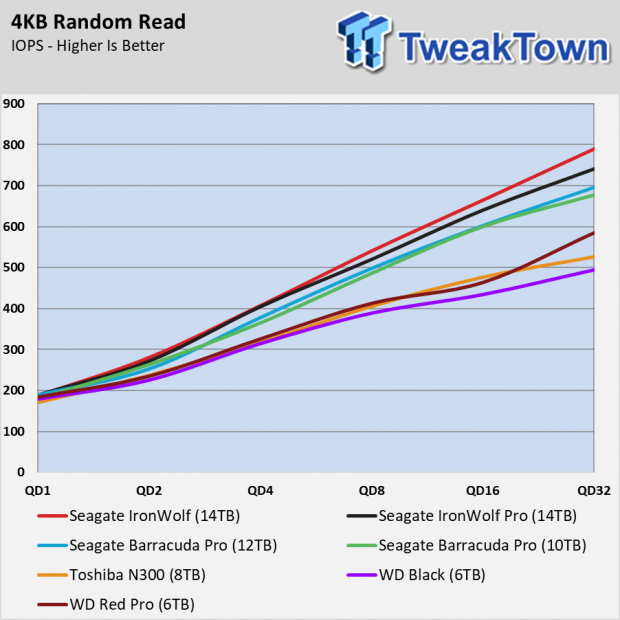
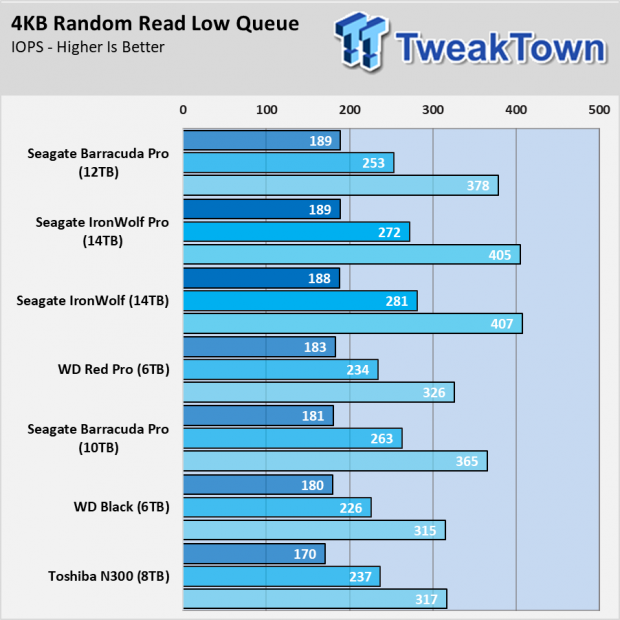
Most HDD manufacturers don't list random performance even though modern HDDs have made great progress in this area.
Random Write Performance
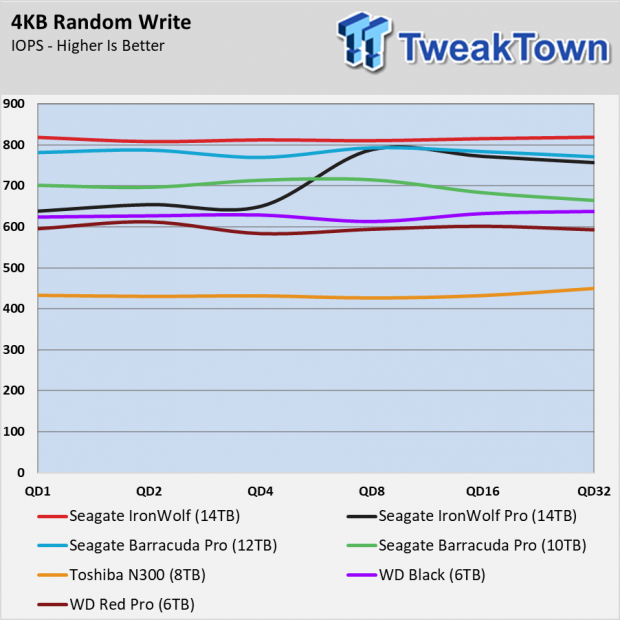
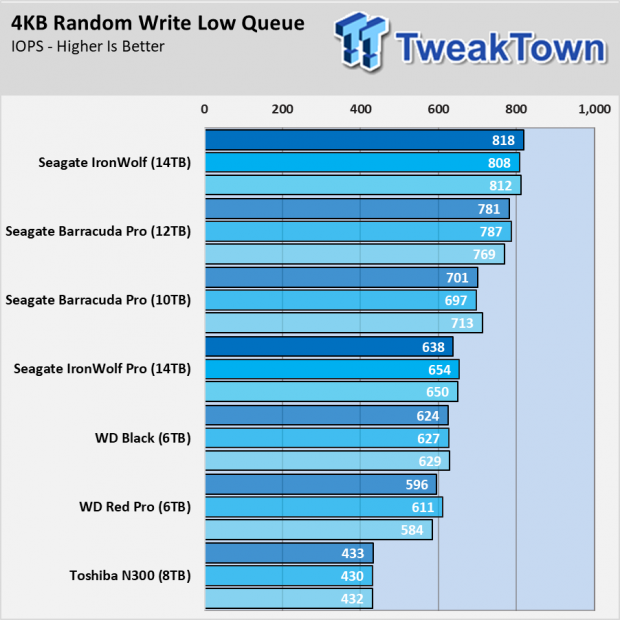
Random write performance has also increased over the last few years. Here we start to see some differences between the Pro and non-Pro, but not in the way you expect. The 14TB non-Pro delivers significantly higher random write performance compared to the 14TB IronWolf Pro. We tested both drives in the same system, in a controlled environment, with identical settings.
70% Read Sequential Performance
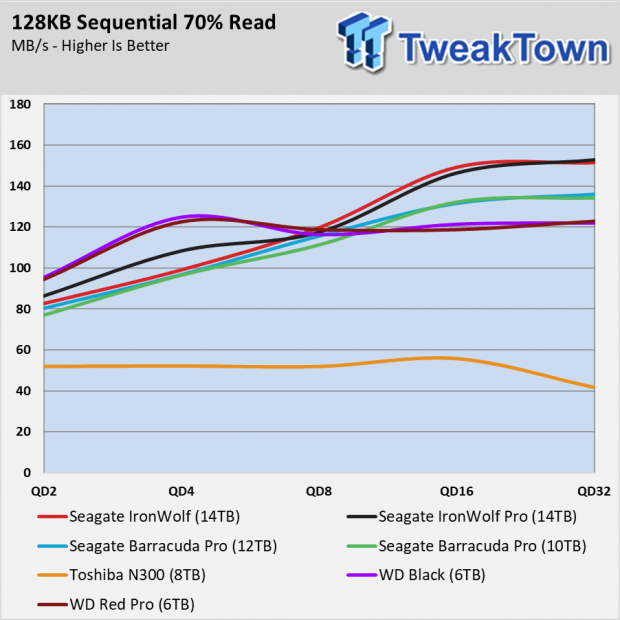
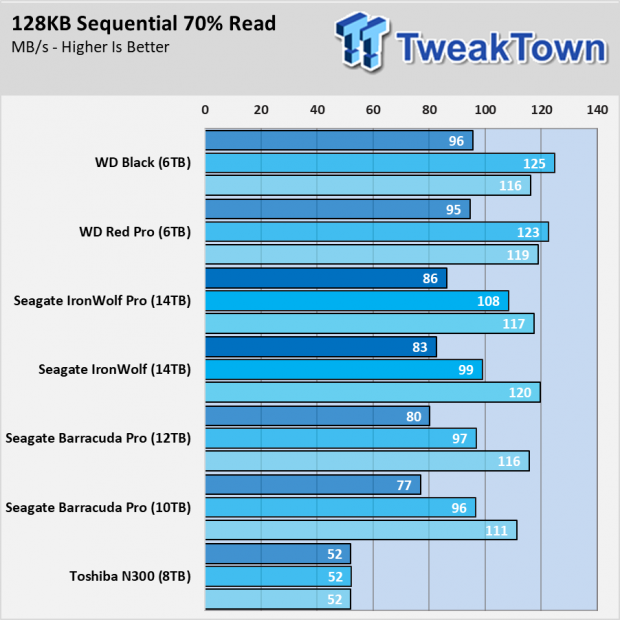
Seagate HDDs do not lead the sequential mixed workloads. This is reading and writing data to the drives at the same time with a 70% read scale. The new IronWolf 14TB series drives improve on the previous generation Barracuda Pro series (12TB and 10TB) but only by a small margin.
70% Read Random Performance
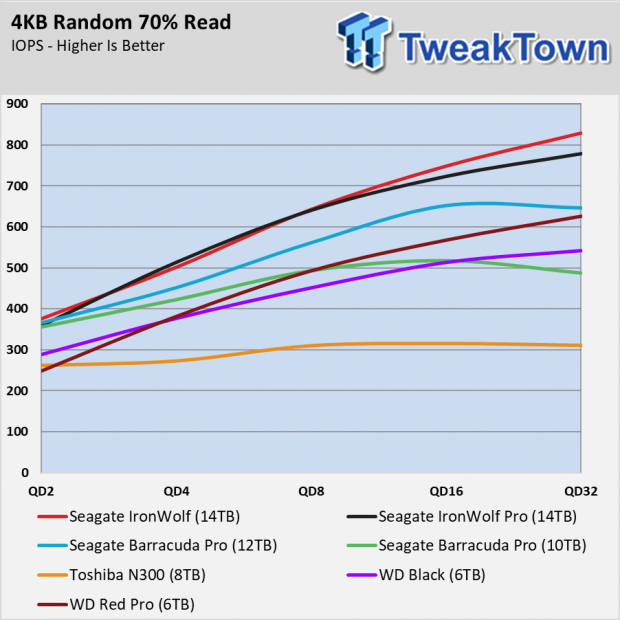
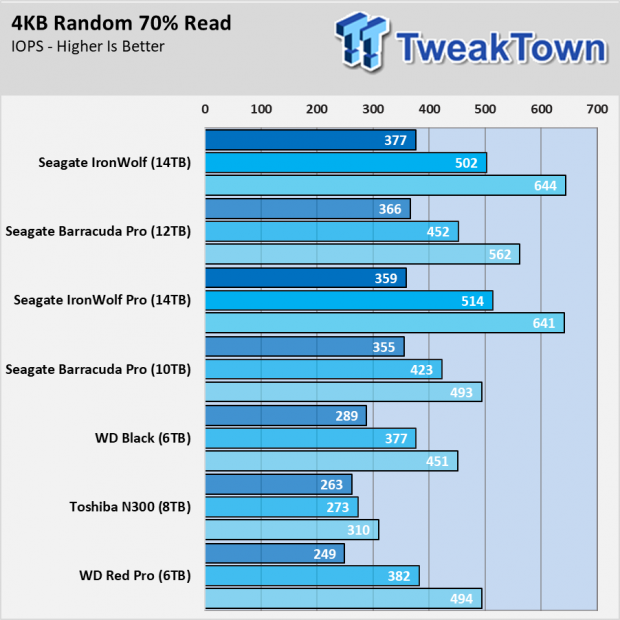
Seagate does lead the random mixed workload tests over the Western Digital drives. Again we see the base IronWolf drive outperform the Pro model at low queue depths.
Game Load Time
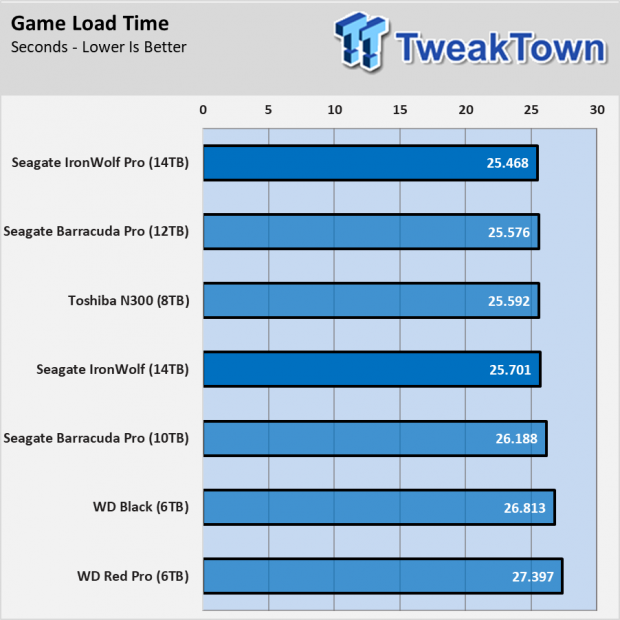
Moving over to real application workloads with the hard disk drives. The 14TB IronWolf Pro loads the Final Fantasy: Stormblood game faster than any other drive. It's actually faster than any other HDD we've tested and that includes older Raptor drives with 10,000 RPM platters.
PCMark 8 Total Storage Bandwidth
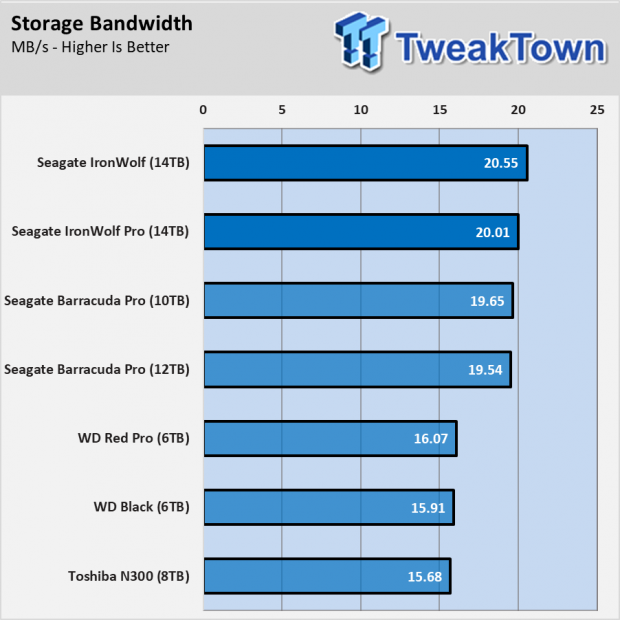
The PCMark 8 Stooge Bandwidth test uses nine applications to run ten different traces with software most of us use every day. Here we see an incremental throughput improvement over the Barracuda Pro drives released last year (12TB) and the year before (10TB).
NAS Testing
NAS Testing
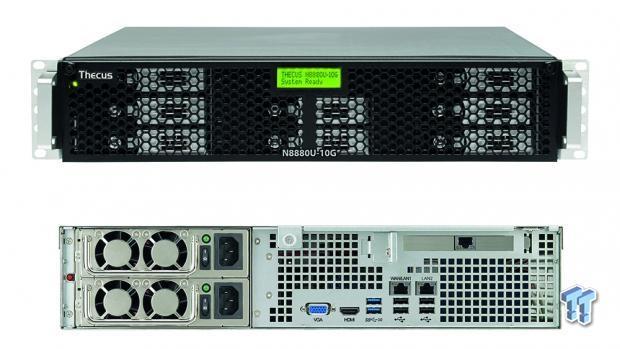
In this section, we load four identical drives in a Thecus N8880U-10G rackmount NAS. The system connects to an enterprise network via a 10GbE link. The test system also connects to the same network over 10GbE and runs the workloads remotely.
Most of the tests happen over CIFT (//name_of_NAS/test_folder) but we also run an iSCSI test at the end of this page.
In a NAS, we have much more variability in the performance. This comes from two areas. The first is the nature of moving data over a network with two systems working together. Both systems have an operating system and power management that wakes, puts to sleep, and manages bus speeds.
The second variability is the one we're looking for and testing. When you combine drives in an array, the latency from one drive feeds the others. The latency compounds with the length of the test. Drives with lower latency will process the commands faster and higher latency will rapidly build and present itself as lower performance. Our RAID 5 array with just four drives shows a typical NAS used at home or a small office. More drives show in an array exacerbate the latency difference between products.
Sequential Read Performance
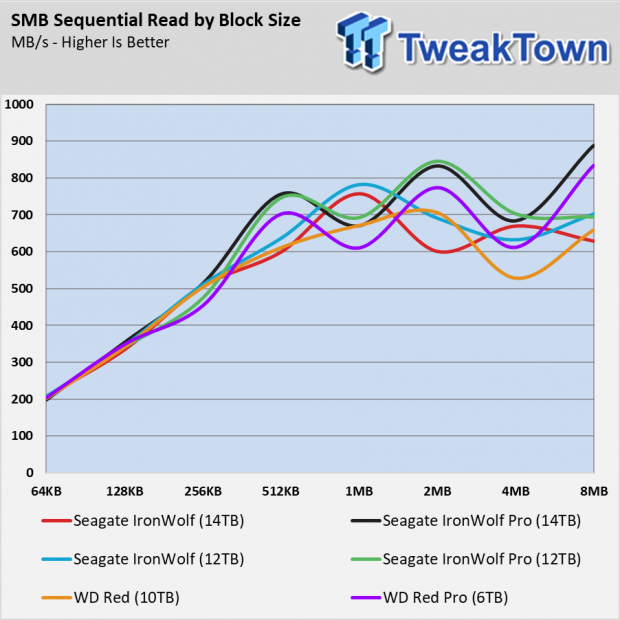
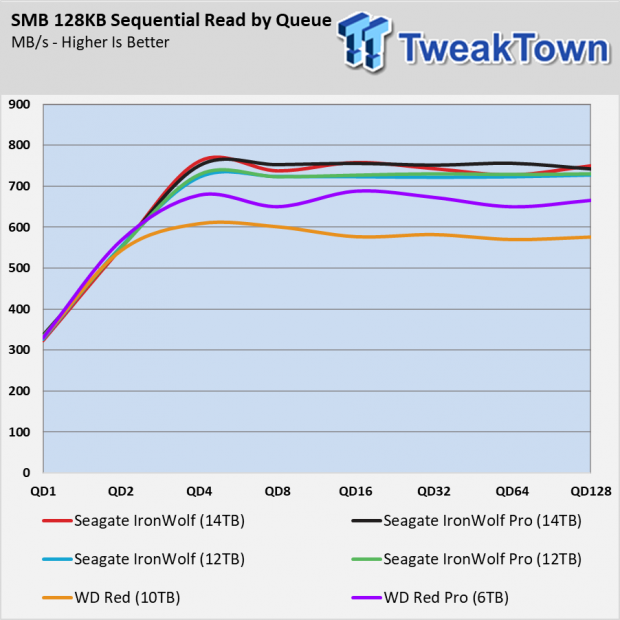
Here we present random read performance in two ways. The first is by block size or the size of the data transferred in each request. The 64KB, 128KB, and 256KB sizes appear well controlled, but as we get to larger sizes, the NAS's buffer play a larger role in the file reads. This is a superior test when comparing NAS against each other.
The second chart shows 128KB blocks coming from the NAS at different queue depths. This is a better test for comparing storage media.
The two new 14TB class IronWolf HDDs are faster than the previous generation. All four IronWolf HDDs are faster than the WD Red 10TB drive array and Red Pro array built with 6TB drives.
Sequential Write Performance
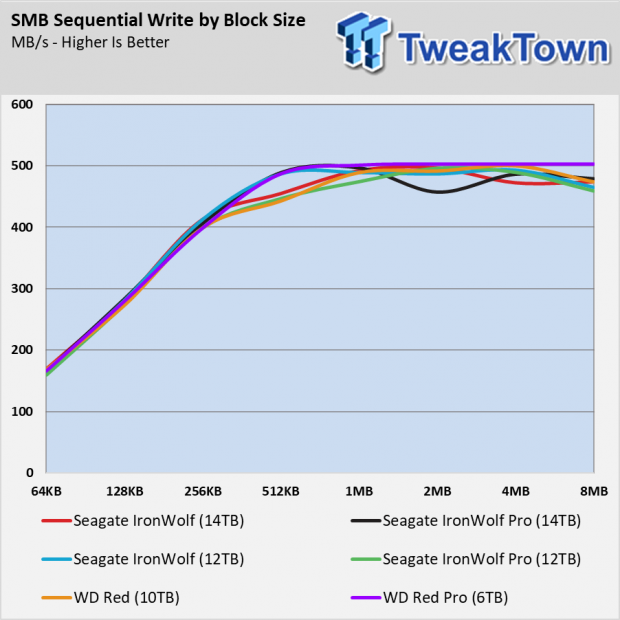
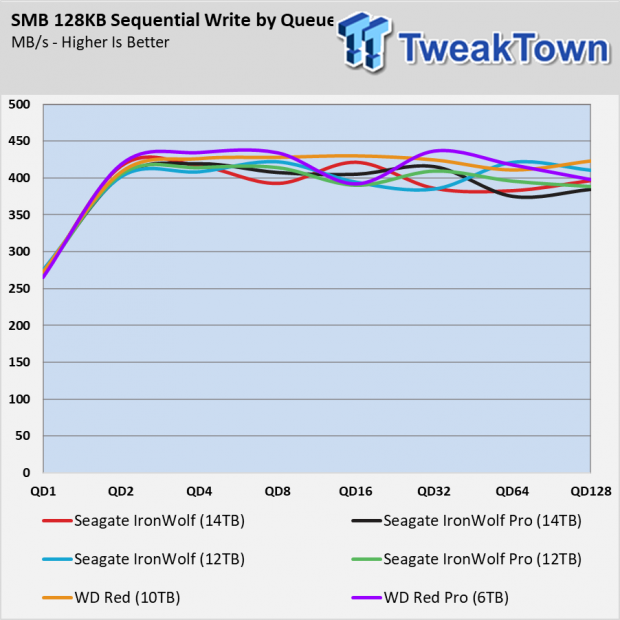
In the block size test, we see less variation than the previous test where we read data from the array.
The sequential write test has much more variability with all of the arrays snaking around one another.
Sequential Mixed Performance
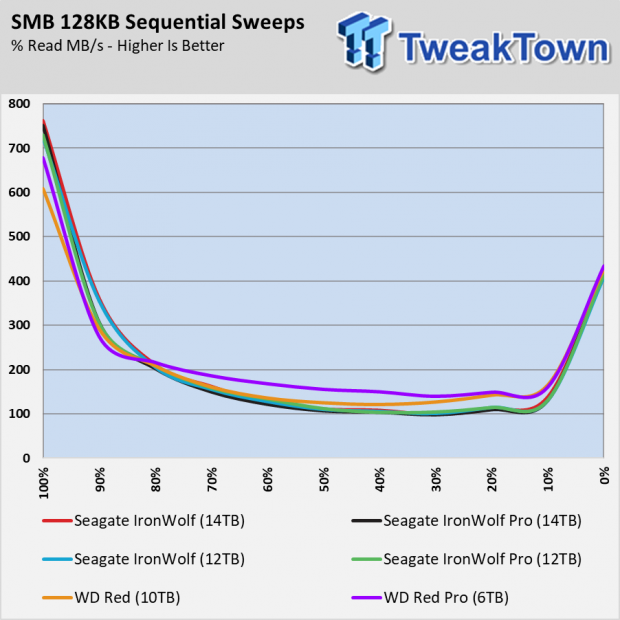
The sequential "sweeps" show the percent of data reads in a workload. The closer you get to a 50% read mix, the lower the performance. On the previous page, we learned the Seagate drives have more trouble with sequential mixed workloads than Western Digital HDDs. That comes through in our test with the media in a NAS.
Random Read Performance
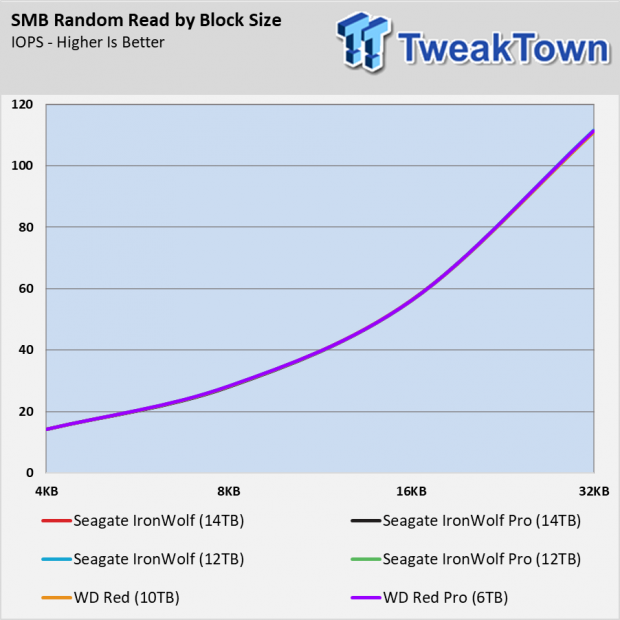
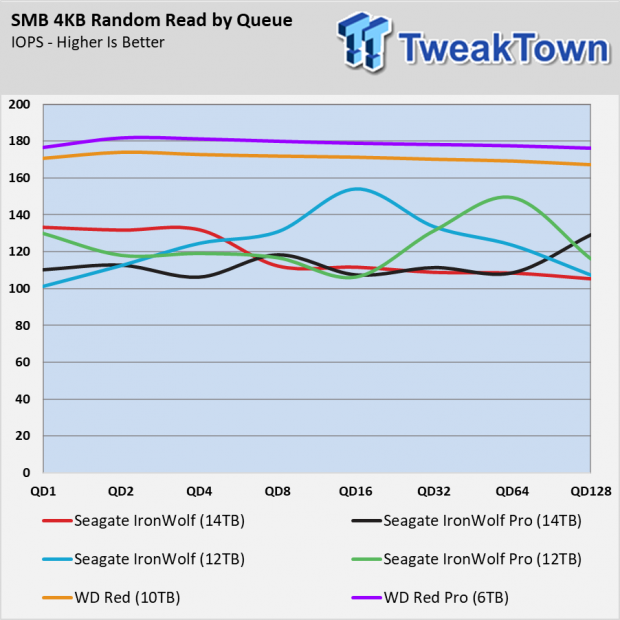
Have you ever seen so little variation in a test before? At the very top of the 32KB area, you can start to see a sliver of the other colors different arrays. This leads us to believe the bottleneck in our block size random read test is the NAS and not the drives. The 4KB performance also shows that compared to what we measured on a single drive.
Moving over to 4KB reads exclusively in the second chart, we see the IronWolf series drives well under the two Western Digital HDDs.
Random Write Performance
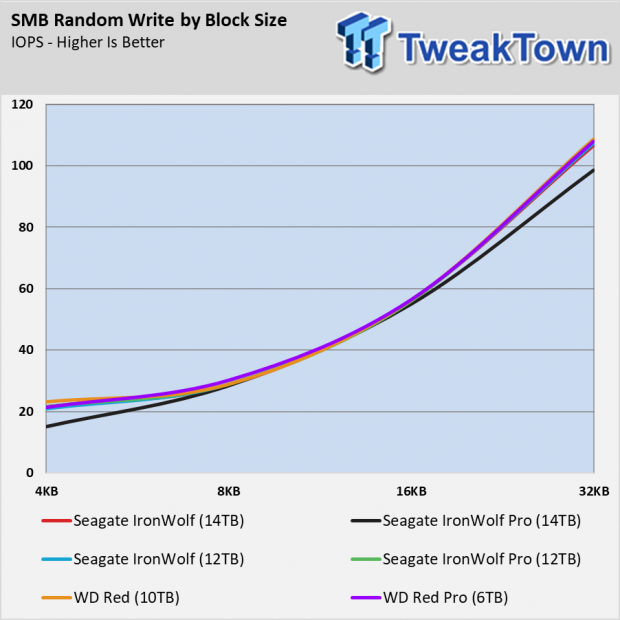
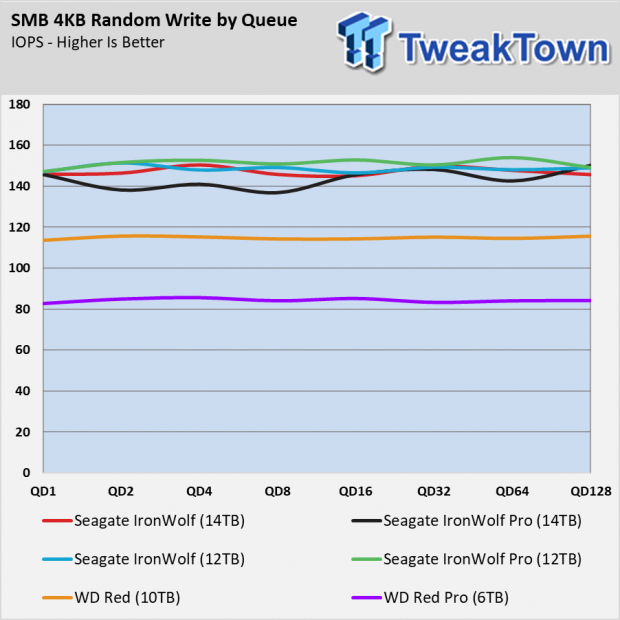
The IronWolf drives perform much better in the random write test. All four IronWolf drives are right together with only a small performance difference between them.
Random Mixed Performance
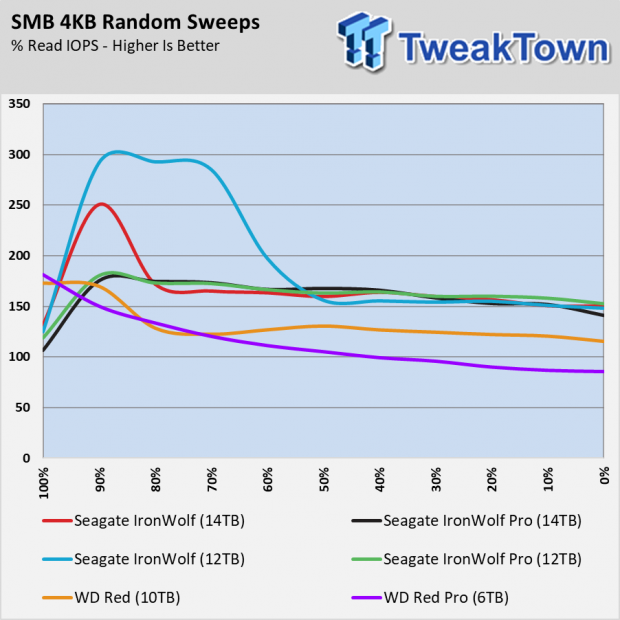
The random mixed workload test shows a lot of variability, but this comes mainly from the NAS and not the array. The DRAM buffer in the NAS causes a lot of issues when comparing different arrays. The IronWolf series is clearly faster than the Western Digital Red drives.
Traditional Server Workloads
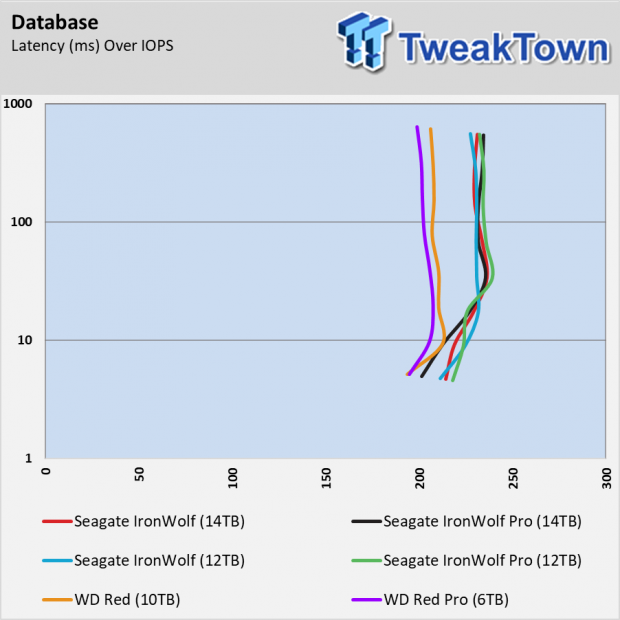
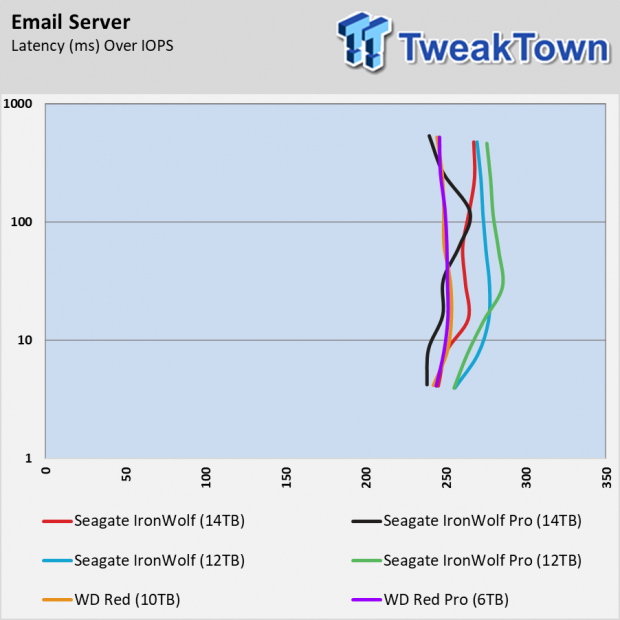
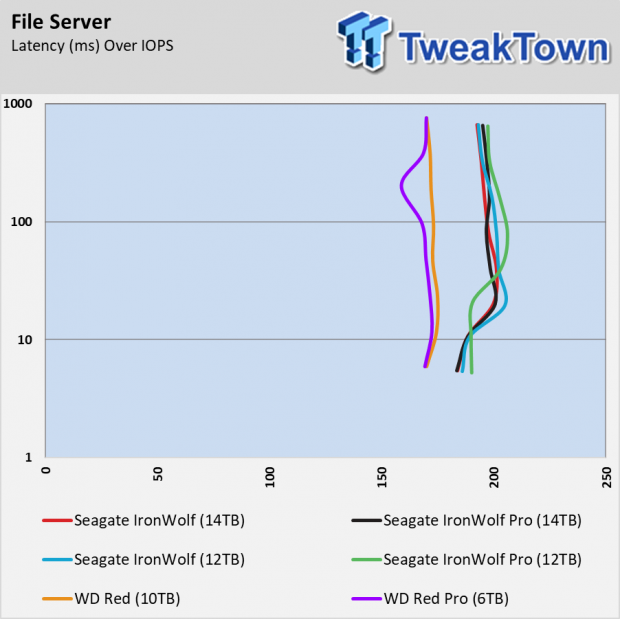
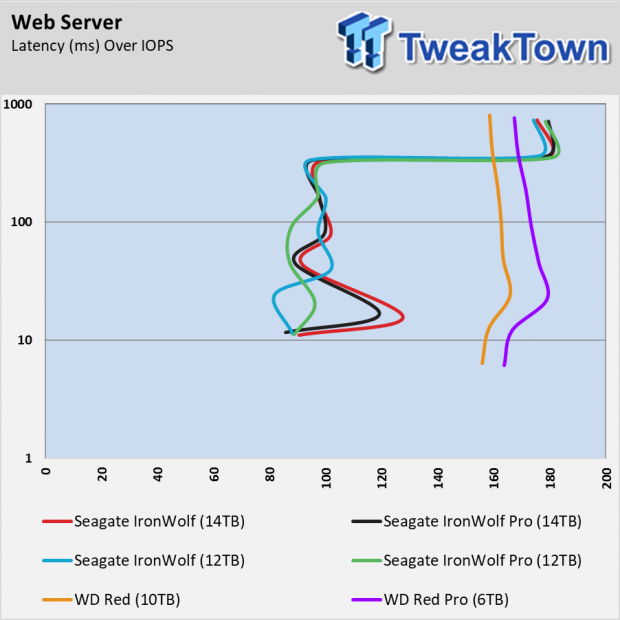
In three of the four server workloads, the IronWolf series outperforms the Reds. There is very little difference between the new 14TB generation and the year-old 12TB generation.
Multiclient Office Workload
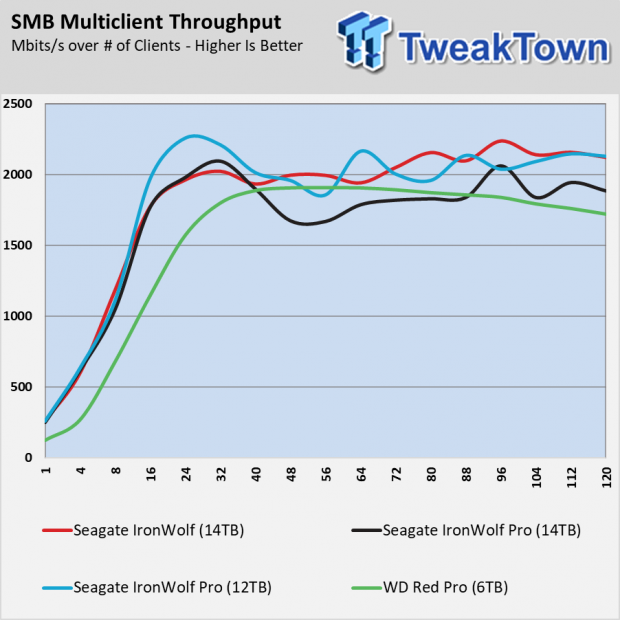
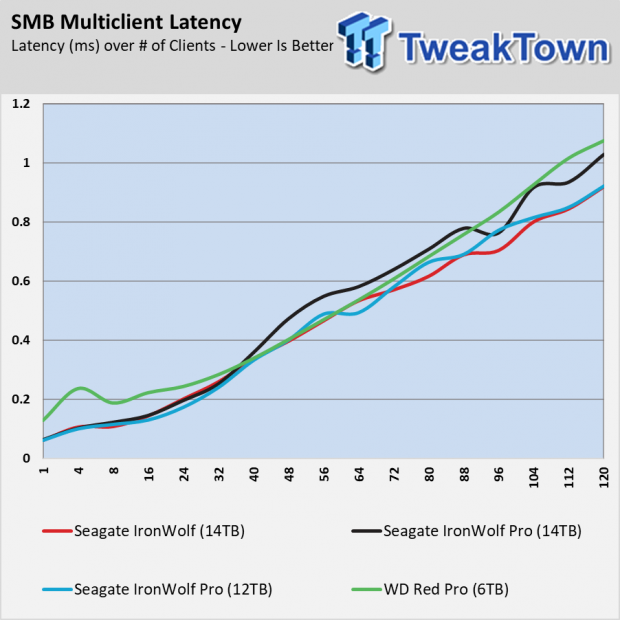
The multi-client test is my favorite because we built most of it. The test took over a year to build and takes ten dual Xeon servers that cost many thousands of dollars. The workload comes from Microsoft Office and is a mix of Excel, Word, and Power-Point. A single PC doesn't stress a NAS or array with this mostly random workload. As more computers connect to the system, up to 120 in total, the NAS and array start to reach the throughput limits, and the latency begins to increase rapidly.
The Red Pro 6TB array shows a very consistent rise and fall in the throughput graph. The IronWolf drives are faster, but slow less consistency.
PCMark 8 Total Storage Bandwidth Over iSCSI
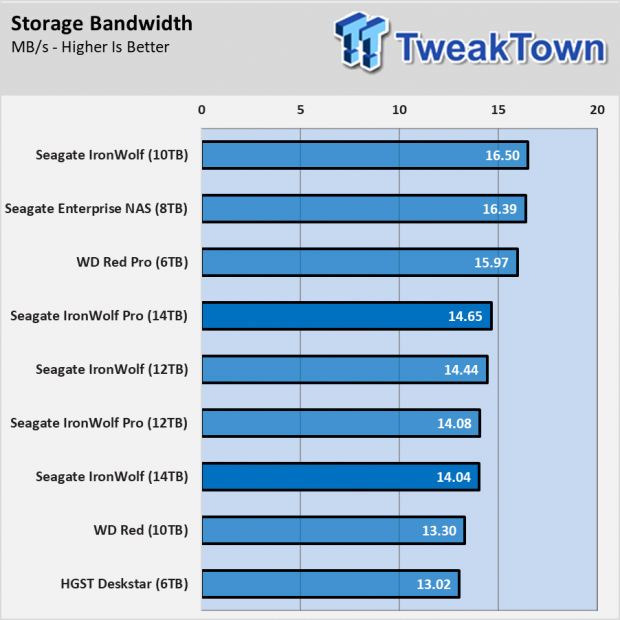
Our only iSCSI test uses the same PCMark 8 Storage Test that we used on the previous page. The difference here is that the target drives are in an array and tested over a network. iSCSI is one of the best options available for gamers to load a lot of games on a redundant array without placing the drives in the local PC. This places the storage in another location.
The 14TB IronWolf drives, both the Pro and non-Pro, are a little slower in this test than the two previous generations. The difference is small, but we expected the new series to outperform the previous generation. The specifications show the 12TB and 14TB drives with very similar performance.
Final Thoughts
There is more to the current NAS HDD story than what we presented today. The first is the competition, a major consideration when shopping. Traditionally the Western Digital Red product line was Seagate's largest competition in this market. WD hasn't updated the two series since the 10TB models came to market in mid-2017. The Red series still operates at 5,400 RPMs. Users need to upgrade to the Red Pro series to get 7,200 RPM platters. Toshiba recently released an update to the N300 Series but the drives only scale to 10TB. HGST also has a NAS specific series, Deskstar NAS, and it only scales to 10TB.

Seagate didn't invent the Helium-filled HDD, but it's one of the only companies to use the technology to continue a rigorous release schedule with consumer and SMB-class products. Other companies use the technology, but most of those products have a heavy focus on the datacenter. The newer WD Reds also use Helium to stuff a large number of platters in drives, but the release schedule has grown longer with each new release.
As it sits right now, Seagate is the only company with a 14TB consumer class NAS HDD. Most of our reader's attention should be on the non-Pro IronWolf for use in NAS appliances. The base model supports up to eight drives in a system and most of us don't populate massive rackmount systems in our homes.
The base IronWolf delivers exceptional performance. The 7,200-RPM design means you won't have buyer's remorse from buying a slower 5,400 RPM model. In our testing, the IronWolf in smaller arrays and as a single drive is actually slightly faster than the IronWolf Pro.
The unintended consequences of the new 14TB drives coming to market for shoppers is it drives the cost down for the smaller models. The IronWolf 12TB is now down to $399, and the 10TB is down to $299. When building a high capacity array, it's often cheaper to use more drives that have less capacity. This is also dependent on your NAS, but a good reason to buy an appliance that runs five disks instead of just four. You will also see a performance benefit in using five drivers over four.
The Seagate IronWolf continues to be a strong choice for shoppers looking to fill new NAS systems. The drives are quiet and run cool thanks to Helium-filled technology. Some may have written off platter-based technology but recent innovations have made these products more reliable, significantly faster, and they are still the most cost-effective way to hold large volumes of data.

 United
States: Find other tech and computer products like this
over at
United
States: Find other tech and computer products like this
over at  United
Kingdom: Find other tech and computer products like this
over at
United
Kingdom: Find other tech and computer products like this
over at  Australia:
Find other tech and computer products like this over at
Australia:
Find other tech and computer products like this over at  Canada:
Find other tech and computer products like this over at
Canada:
Find other tech and computer products like this over at  Deutschland:
Finde andere Technik- und Computerprodukte wie dieses auf
Deutschland:
Finde andere Technik- und Computerprodukte wie dieses auf